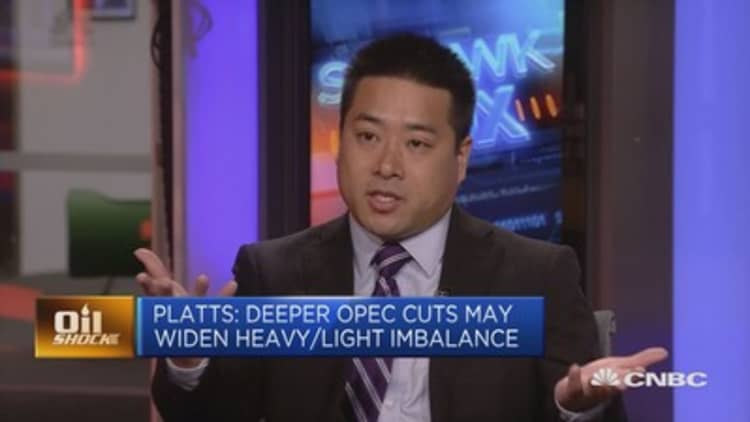
Oil supply could easily be threatened by geopolitical risks, and such a disruption could cause oil prices to skyrocket, experts tell CNBC.
Neil Dwane, global strategist and chief investment officer of European equity at Allianz Global Investors, warned that oil production supply is looking threatened around the world.
"Venezuela's 2 million barrels of oil a day could literally go any day. Mexico looks poor. Azerbaijan's in trouble. China's own production is collapsing rapidly," he told CNBC's Squawk Box on Friday.
"One only has to have one mistake and the only thing you'll be talking about all morning is oil at $120."
Dwane said geopolitical risks could cause prices to skyrocket as several oil producing states are fragile, and oil prices are currently too low for anyone to want to drill fresh wells which may be needed in the future.
Herman Wang, OPEC specialist at S&P Global Platts, agreed that there is significant geopolitical risk to oil supply.
"There are plausible scenarios where you could see, perhaps not $120 a barrel, but an elevated oil price, say $70 to $80 on some of these geopolitical and some of the supply concerns. Venezuela certainly is a mess right now," he told CNBC's Squawk Box on Friday.
The 'million barrel question'
Even without these geopolitical concerns, OPEC must face the "million barrel question" if it ever hopes to rebalance the global oil market.
U.S. oil production increased by 88,000 barrels per day (bpd), or more than 1 percent, to 9.34 million bpd, according to data from the U.S. Energy Information Administration. Meanwhile, OPEC's output rose by 220,000 bpd to 32.49 million bpd in June, according to the S&P Global Platts survey published on Thursday.
However, U.S. crude oil stockpiles did fall sharply by 6.3 million barrels in the week to June 30. Whether or not stockpiles will fall faster in the coming months is the "million barrel question" according to Wang, but he thinks a rebalance by 2018 is unlikely.
"U.S. production is already half a million barrels above where it was when this production cut deal from OPEC started. You've got Libya and Nigeria, they're militancy seems to be calming there now," he said.
"Their production is up about 400,000 bpd combined above where it was from October levels. So you combine U.S. with Libya and Nigeria, that's almost a million barrels per day, undoing more than half of this combined 1.8 million bpd OPEC and non-OPEC production cut."

The S&P Global Platts survey found Libya and Nigeria increased oil production increased by 80,000 bpd and 50,000 bpd respectively last month. Both are exempt from the OPEC production cut agreement, and that's becoming a problem for OPEC.
"Libya and Nigeria were given a free pass when the deal started in Jan 2017 because civil unrest meant their production was significantly down on what they have historically achieved," said Spencer Welch, director of oil markets & downstream energy at IHS Markit, told CNBC via email.
"Both were also given a free pass for the roll-over of the deal through to end 1Q 2018, it was always a big risk that either or both would find a way of increasing production."
In May, several OPEC and non-OPEC nations agreed to extend production cuts of 1.8 million bpd until March 2018. Welch says this coalition of supply cutters is now being hit by a "double whammy" of increased production from OPEC members and the U.S.
"This plus the U.S. effect is neutralizing the impact of the supply cuts and keeping a firm lid on crude prices. This is a worry for the supply cutting coalition," he said.


